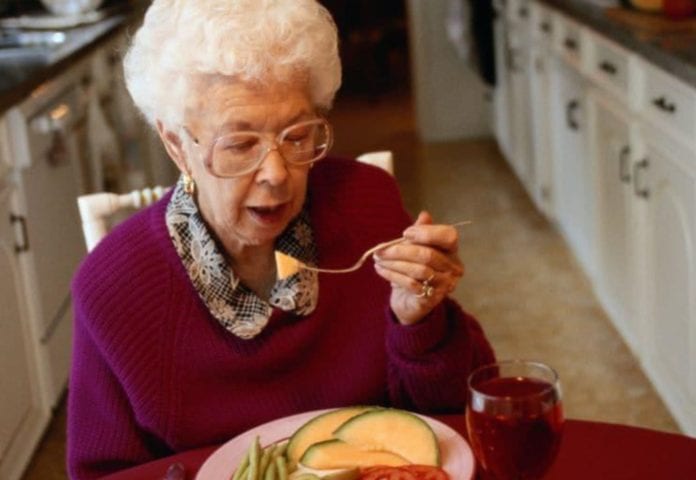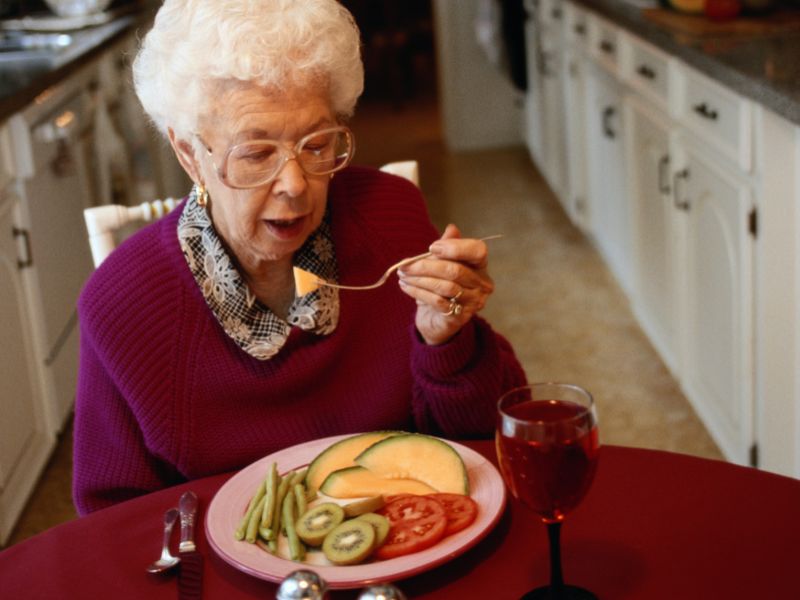Fr: Hong Nguyen
Kết quả nghiên cứu: Nhiều người Mỹ cao niên, tàn tật, thường xuyên bị đói
Người Việt- September 30, 2019

Tình trạng thiếu ăn ở người cao niên Mỹ đang lên cao. (Hình: HealthDay News)
WASHINGTON, D.C. (NV) – Kết quả một cuộc nghiên cứu mới đây cho thấy gần 10% người Mỹ cao niên thường bị đói.
Bản tin của hãng thông tấn UPI hôm Thứ Hai, 30 Tháng Chín, nói rằng trong số những người dưới 65 tuổi nhưng được hưởng Medicare vì bị tàn tật, có tới 40% thường xuyên bị cái đói đe dọa, theo các nhà nghiên cứu.
“Người ta hay nói về Medicare và làm sao sửa đổi để nhiều người được sự giúp đỡ, nhưng đói kém, một vấn đề xã hội, cũng là điều phải quan tâm,” theo lời tác giả cuộc nghiên cứu, Giáo Sư Jeanne Madden thuộc trường đại học Northeastern University in Boston.
Giáo Sư Madden nói vấn đề vẫn được các nhà nghiên cứu gọi là “bất ổn lương thực” không phải là điều gì mới. Điều này được chính thức định nghĩa là “không có đủ thực phẩm cần dùng vì các lý do tài chánh.”
Bà Madden nói hiện đang có các nỗ lực trong hệ thống y tế để đối phó với các vấn đề này, như hỏi thăm bệnh nhân về tình trạng thực phẩm của họ và giới thiệu họ với cán sự xã hội để có thể giúp tìm các nguồn trợ giúp như SNAP, từ chính quyền liên bang Mỹ.
“Nhưng đây là vấn đề lớn lao và nếu chỉ tìm cách giải quyết qua hệ thống y tế thì chẳng khác nào lấy tay chặn vết thương rỉ máu,” theo bà Madden.
Trong cuộc nghiên cứu, Giáo Sư Madden và toán của bà xem xét các dữ kiện từ gần 10,000 người tham dự cuộc thăm dò năm 2016 của Medicare. Trong số này có hơn 8,000 người hơn 65 tuổi và hưởng Medicare, với khoảng 1,600 người khác dưới 65 và cũng được hưởng Medicare.
Có 38% trong số người dưới 65 nói rằng họ thường xuyên bị đói. Có hơn 9% những người trên 65 tuổi cũng cùng hoàn cảnh.
Các yếu tố góp phần tạo thêm nguy cơ lâm vào tình trạng thiếu ăn gồm cả việc chỉ có lợi tức dưới $15,000 mỗi năm, có ít nhất là bốn loại bệnh kinh niên (mãn tính), bị trầm cảm và lo lắng.
Bà Dawn Apgar, thuộc đại học Seton Hall University ở South Orange, tiểu bang New Jersey, nói rằng “vấn đề bị đói thường không được đề cập tới ở Mỹ, do vậy cuộc nghiên cứu này quan trọng vì nhắc nhở cho chúng ta hiện có nhiều bất bình đẳng còn tồn tại về những người có đủ thức ăn bổ dưỡng và những người không có được điều này.”
Cũng theo bà Apgar, vẫn còn có nhiều người, nhất là người cao niên, ngại ngùng, tự ái, không cho biết là mình bị đói.
Cuộc nghiên cứu này được đăng tải trên tạp chí y khoa JAMA Internal Medicine hôm 30 Tháng Chín. (V.Giang)
https://www.nguoi-viet.com/hoa-ky/ket-qua-nghien-cuu-nhieu-nguoi-my-cao-nien-tan-tat-thuong-xuyen-bi-doi/
Many U.S. Seniors Are Going Hungry, Study Finds

By Serena Gordon
HealthDay Reporter
MONDAY, Sept. 30, 2019 (HealthDay News) -- Almost 1 in 10 U.S. seniors doesn't have enough food to eat, a new study shows.
And for those under 65 who qualify for Medicare because they're disabled, 4 of 10 may be going hungry, the researchers added.
"People are always talking about Medicare and how to tweak it and improve access to care, but these kinds of social problems [hunger] can be just as much of an issue," said study author Jeanne Madden, from Northeastern University in Boston.
Madden said the problem of what researchers call "food insecurity" isn't a new one. It's officially defined as an inability to get enough food due to financial reasons.
She said things are being done within the health care system to try to address this, such as screening patients for the problem and giving patients access to social workers that can help them find services available to them, such as the Supplemental Nutrition Assistance Program (SNAP) from the U.S. federal government.
"But it's a systemic problem and people really struggle. Addressing it solely in the health care system is just staunching the bleeding," Madden added.
For the study, she and her team looked at data from nearly 10,000 people who took part in a 2016 Medicare survey. Just over 8,000 were over 65 and on Medicare, and almost 1,600 were under 65 and on Medicare.
Thirty-eight percent of those under 65 reported they were going hungry. Slightly more than 9% of those over 65 were in the same boat. Risk factors that increased the odds of going hungry included having an income of less than $15,000 a year, four or more chronic illnesses, depression and anxiety.
Dawn Apgar is director of the Department of Sociology, Anthropology and Social Work at Seton Hall University in South Orange, N.J. "This study highlights an important social problem -- food insecurity among older adults," she said.
"The issue of hunger is often not discussed in the United States, so this study is important to reminding us that there are disparities which still exist between who has access to adequate and nutritious food and who does not," said Apgar, who wasn't involved with the research.
She said there's often still a stigma attached to the problem, especially for older adults. That may keep people from accessing government programs when they need them. Plus, with America's obesity problem, people often don't realize that not having enough food or not having access to nutritious food is a big problem, too, Apgar noted.
Both Madden and Apgar also said it's possible that food insecurity might set up a vicious circle. If someone isn't getting enough food, that might lead to worsening health, which in turn might then lead to even more trouble getting enough food.
For people checking in on older parents or grandparents, Apgar said that not having enough food to eat is often a problem that emerges slowly. Decreased mobility, lower income and chronic illnesses are factors that may play a part.
"Weight loss or other physiological changes may be indicators of poor nutrition," she said. "Often, older adults may not even realize that they are food-insecure. Children and grandchildren should never assume that food insecurity is not a problem for the older adults in their lives, as it is often hidden and hard to detect."
Apgar pointed out that even if finances aren't a concern, older people or those with chronic illnesses may have trouble making meals or getting nutritious foods.
She said Meals on Wheels, which delivers food to needy or homebound people, can be very helpful for addressing the nutritional needs of older adults. Apgar said it has the added benefit of helping lessen social isolation.
The researchers suggested automatic enrollment or an easier recertification process for low-income people receiving food assistance might help lessen the problem in these vulnerable groups.
The findings were published Sept. 30 in the journal JAMA Internal Medicine.
https://consumer.healthday.com/senior-citizen-information-31/senior-citizen-news-778/many-u-s-seniors-are-going-hungry-study-finds-750733.html
*****